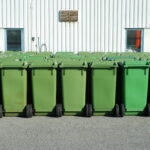Since 2014, when the Massachusetts Department of Environmental Protection (MassDEP) enacted the Commercial Organics Disposal Ban, businesses and institutions across the state have increasingly diverted food waste. While food waste diversion leads to significant environmental benefits, it also has the potential to provide cost savings for businesses and creates opportunities to address customer and employee…
Replacing single-use foodservice container options with reusables can reduce both disposal costs and long-term purchasing needs for restaurants and other food service businesses. According to Clean Water Action, packaging waste makes up approximately 30% of waste disposed of in the US, and these products “consume a tremendous amount of resources — including oil, trees, energy,…
On March 23rd, 2023, MassRecycle held their annual Conference and Trade show at the Best Western Royal Plaza Hotel in Marlborough. MassRecycle is a Massachusetts organization that assembles stakeholders to provide solutions to waste reduction and recycling issues as well as advocates for practical and effective legislation. The conference and trade show welcomed a large…
The “Williamstown Composts!” pilot program in Williamstown, launched for residents in 2018, has now expanded to include businesses. This local effort is supported in part by Community Climate Fund (CCF), which is administered by the Center for EcoTechnology (CET) and receives funding from Williams College. In the expanded pilot program, approved businesses receive funding to…
Recent years have taught us that medical personal protective equipment (PPE), or the masks, gowns, gloves, etc. that keep front line workers and patients safe, are indispensable. In March 2023, Alliance Health & Human Services (AHHS), which owns, operates, and manages several skilled nursing and rehabilitation facilities in Massachusetts, encountered a large amount of surplus…
Sanofi, a global pharmaceutical company with an administrative headquarters in Cambridge, is fixed on a zero-waste goal. By 2025, they aim to be 100% disposal-free. The path to zero waste is paved with choices. Where should recycling and food waste receptacles be located? Is reusable or recyclable serviceware the better option? Whose responsibility is it…
The Healey-Driscoll Administration recently awarded $950,000 in Recycling Business Development Grants (RBDG) to six recycling companies in the state. The RBDG program helps businesses tackle difficult-to-recycle materials, such as contaminated food materials, construction and demolition wood, and bulky rigid plastics. The funds will help these businesses expand their operations and capacity to process recyclable materials which supports…
On the surface a beloved diner and a commercial construction manager might not have much in common. But the reality is that every business can benefit from new or improved waste handling practices. RecyclingWorks in Massachusetts (RecyclingWorks) excited to present two recent case studies that showcase environmentally responsible and community supported waste management programs: Johnny’s…
RecyclingWorks in Massachusetts (RecyclingWorks), in collaboration with the Massachusetts Department of Environmental Protection (MassDEP), hosted the RecyclingWorks MA Fall 2022 Forum virtually on November 9, 2022. This year’s forum focused on updates and resources to help businesses and institutions understand and comply with changes to MassDEP waste disposal bans on commercial food waste, textiles, and…
The dining halls and eateries at colleges and universities are ripe with waste prevention opportunity. Transitioning away from single-use takeout containers is one way institutions can significantly reduce their waste and carbon footprints. This year, Mount Holyoke College swapped out its single-use food containers and cups for returnables. The college accomplished this by partnering with…

